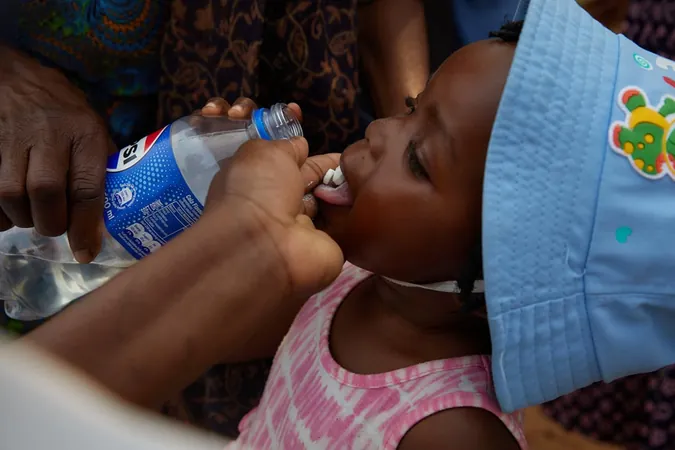
Zimbabwe Launches Mass Campaign Against Elephantiasis: A Struggle for Many Lives
2024-12-09
Author: Wei Ling
In the scenic mining town of Shamva, located in north-eastern Zimbabwe, Tinotenda's childhood was filled with dreams and aspirations. However, her future took a dark turn when she began suffering from excruciating pain and swelling in her leg due to a debilitating condition known as elephantiasis. "At first, it was just pain, but as time went by, my leg swelled painfully, making walking an agonizing experience," she recalled.
Elephantiasis, caused by parasitic worms transmitted through mosquito bites, leads to disfiguring swelling of the limbs and genitals, often resulting in severe pain, disability, and a decreased quality of life. Despite experiencing this pain daily and having to quit school, Tinotenda remains hopeful, relying on painkillers and occasional medical assistance that offer only temporary relief.
The World Health Organization (WHO) estimates that approximately 51 million people were affected by lymphatic filariasis (LF), which includes elephantiasis, in 2018. Thankfully, there has been a significant 74% drop in cases since the WHO’s elimination program began in 2000. However, for many like Tinotenda, the damage was already done, with about 36 million people worldwide still living with the debilitating aftermath of the disease.
In a recent report, the WHO identified elephantiasis, alongside bilharzia and blinding trachoma, as one of the top neglected tropical diseases (NTDs) affecting Zimbabwe. Observing the rising cases of elephantiasis, the Ministry of Health and Child Care swiftly initiated a mass drug administration (MDA) campaign from September 16 to 28, aiming to reach 1.4 million people in seven districts. This campaign was informed by a 2021 survey that highlighted areas with insufficient treatment coverage for LF and related diseases.
During the campaign, a staggering amount of medication was distributed, including 8,789 boxes of albendazole tablets and 6,116 bottles of Ivermectin, showcasing a massive effort to tackle the disease at a community level. The MDA not only targeted the disease but also aimed to educate the population about its causes and prevention, transforming lives in the process.
Sithulile Bhebe, who actively participated in the campaign, reflected on the grassroots mobilization, saying, "We rode our bicycles from door to door, informing people about the medication and its importance in combating elephantiasis. Many were eager to partake in the treatment." Their initiatives bore fruit when the 12-day campaign reportedly reached over 1 million individuals with a remarkable 73% success rate.
Organizations like the Higherlife Foundation are also collaborating in this fight, emphasizing that improving health outcomes is crucial for education and socioeconomic development in the region. "Failure to eliminate LF compromises educational success and economic progress," says Rebecca Mwabvu, General Manager of Global Health at Higherlife Foundation.
Professor Francisca Mutapi of Tackling Infections to Benefit Africa (TIBA) insists that eradicating LF must go beyond mass drug administration. Comprehensive strategies need to include prevention initiatives, ongoing treatment, and support for those already affected by chronic conditions as a result of LF.
For individuals like Tinotenda, enduring unbearable pain and disability, the hope for a brighter, healthier future remains a distant dream. "If only I had not contracted this disease, my life might have been so different," she ponders, as she battles not only elephantiasis but also the limitations it imposes on her life.
The mass drug administration initiative signifies a crucial step in tackling this disease, although continuous efforts are necessary to ensure those affected do not remain marginalized and their dreams are not forsaken.

 Brasil (PT)
Brasil (PT)
 Canada (EN)
Canada (EN)
 Chile (ES)
Chile (ES)
 España (ES)
España (ES)
 France (FR)
France (FR)
 Hong Kong (EN)
Hong Kong (EN)
 Italia (IT)
Italia (IT)
 日本 (JA)
日本 (JA)
 Magyarország (HU)
Magyarország (HU)
 Norge (NO)
Norge (NO)
 Polska (PL)
Polska (PL)
 Schweiz (DE)
Schweiz (DE)
 Singapore (EN)
Singapore (EN)
 Sverige (SV)
Sverige (SV)
 Suomi (FI)
Suomi (FI)
 Türkiye (TR)
Türkiye (TR)